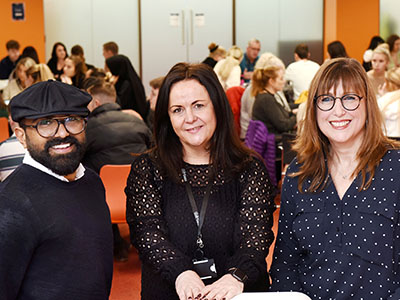Course overview
Accredited Foundation year Work placement
Study at Teesside University International Business School
See what it’s like to study at our modern, enterprising and dynamic business school
Whether you want to strike out in business on your own, or work with international companies, start-ups or not-for-profit organisations, our business management course gives you the ability and expertise to accelerate your career.
You gain the digital and entrepreneurial skills needed to succeed in any modern business, developing innovative solutions to real-world challenges. Working with live clients including Google, Adobe, PD Ports and Hayes Recruitment, you explore how all functions of a business integrate, developing your academic and practical know-how.
Through our connections with industry, we ensure that you are familiar with the latest trends and impact of digital and AI on business and society.
Top reasons to study business management at Teesside
- Industry input: we work with brands including Coca-Cola, Apple, Virgin Money, Volvo, and Microsoft, to give you experience of working with global organisations.
- Entrepreneurial opportunities: our students have created 500 new business start-ups through Launchpad – a start-up community who provide support and advice for students looking to start a new business venture.
- United Nations’ PRME initiative – we’re a proud signatory of the United Nations’ Principles for Responsible Management Education (PRME) initiative, which aims to globally raise the profile of sustainability and responsible leadership to equip current and future leaders with the skills to deliver positive change for business and society
This course is also offered at our Teesside University London campus. Please note, the structure, content and delivery model is different, visit tees.ac.uk/london for full details.
Course details
Course structure
Year 1 core modules
Study the circular economy and the business opportunities it presents. Develop your own business idea and create a venture with social impact that's part of the circular economy. Consider the fundamentals of user experience and user interface design, and learn about current, appropriate digital tools to design an app for your business idea.
This is a 30-credit module.
How to be a Responsible Leader
Reflecting on your own skills and attributes, you explore the importance that organisations and society place on individual values and behaviours. Through psychometric tests and peer reviews, you understand your own behaviours and the impact this has on your own and others professional practices. You explore links between personal development and success in the workplace, considering the skills required in chosen careers.
This is a 30-credit module.
Organisational Performance and Strategy
Gain basic knowledge of business operations and strategy management principles, focusing on the external environment and identifying factors which may impact on internal capability and resources. You explore the importance of the business environment and the impact of organisational behaviour. As well as organisational resources, capability and competency, risk factors and management, leadership and management, organisational culture, structure and function.
This is a 30-credit module.
Technology in the workplace is changing at a fast pace, with organisations striving to utilise technology to develop efficient business models. You are introduced to emerging technologies and shifting attitudes in the workplace, examining how these new technologies are impacting business and identifying opportunities for the future.
This is a 30-credit module.
Year 2 core modules
Apply your learning directly to a real enterprise. You work in small groups with a local business on a live consultancy brief. You identify the problem, conduct research to come up with a solution and present this to the business. This gives you to the opportunity to explore an enterprise, and the ideas associated with organisational behaviour and managerial approaches to business development in a real-world context.
This is a 30-credit module.
You develop your cultural awareness through a business lens, focusing on common humanity and equal worth. Explore a culture of your choice and consider the development of a new business or the expansion of an existing business into that culture.
This is a 30-credit module.
Create content and manage social media accounts, experimenting with different types of content and analysing the results in real-time. You develop your understanding of how to create high-performing content in a world where social media is used for client engagement and product promotion.
This is a 30-credit module.
Examine the importance of lifelong learning and self-development, exploring your interests and potential careers through online short courses. You develop yourself in preparation for your future career including your personal branding and online presence.
This is a 30-credit module.
Optional work placement year
You have the option to spend one year in industry learning and developing your skills. We encourage and support you with applying for a placement, job hunting and networking.
You gain experience favoured by graduate recruiters and develop your technical skillset. You also obtain the transferable skills required in any professional environment, including communication, negotiation, teamwork, leadership, organisation, confidence, self-reliance, problem-solving, being able to work under pressure, and commercial awareness.
Many employers view a placement as a year-long interview, therefore placements are increasingly becoming an essential part of an organisation's pre-selection strategy in their graduate recruitment process. Benefits include:
· improved job prospects
· enhanced employment skills and improved career progression opportunities
· a higher starting salary than your full-time counterparts
· a better degree classification
· a richer CV
· a year's salary before completing your degree
· experience of workplace culture
· the opportunity to design and base your final-year project within a working environment.
If you are unable to secure a work placement with an employer, then you simply continue on a course without the work placement.
Final-year core modules
Utilising the skills acquired throughout the course, you work on an individual project, investigating a practical business issue, a relevant issue of academic interest, or a live problem-solving project related to the subject. You conduct research to validate hypotheses, test solutions, create outputs, make recommendations and present conclusions. The project is relevant to a business client or industry partner and is an individual piece of work, developed with supervisor support.
This is a 60-credit module.
You work on consultancy projects with organisations, using horizon scanning to spot early signs of potential opportunities, developments and future trends. Analyse your chosen industry and present your research and recommendations on future innovations to the organisations.
This is a 30-credit module.
Reimagining the Future of Business and Society
Unpack the UN's Sustainable Development Goals and explore the utopian and dystopian possibilities of the goals being met or unmet. You develop your understanding of the global impact of these goals while considering global challenges and possible solutions.
This is a 30-credit module.
Modules offered may vary.
How you learn
Modules are taught by lectures, seminars, practical workshops, work-based activities and group work. Teaching staff adopt a range of web-based technologies to deliver module content, assess, provide feedback and communicate with students.
How you are assessed
The programme is assessed via a variety of methods including assignments, group work, presentations and live practical projects.
Our Disability Services team provide an inclusive and empowering learning environment and have specialist staff to support disabled students access any additional tailored resources needed. If you have a specific learning difficulty, mental health condition, autism, sensory impairment, chronic health condition or any other disability please contact a Disability Services as early as possible.
Find out more about our disability services
Find out more about financial support
Find out more about our course related costs
Entry requirements
Entry requirements
A typical offer is 80-104 tariff points from at least two A levels, T level or equivalent.
We welcome applications from mature students without conventional entry requirements. We take into account any alternative qualifications or other experience you may have.
For general information please see our overview of entry requirements.
International applicants can find out what qualifications they need by visiting Your Country.
You can gain considerable knowledge from work, volunteering and life. Under recognition of prior learning (RPL) you may be awarded credit for this which can be credited towards the course you want to study.
Find out more about RPL
Employability
Career opportunities
Due to the diverse nature of the degree our students progress to a range of businesses and sectors securing roles from general business manager to digital business executive, international business representative to social entrepreneur, and retail manager to new business adviser.
We provide an environment that allows you to develop the ‘extra’ practical employability characteristics that will make you more interesting to employers in the job market in the years to come.
Our staff utilise their extensive business connections to provide many and varied opportunities to engage with potential employers through fairs, guest lecture sessions, live projects and site visits. In addition we offer a series of workshops and events in the first, second and third year that ensure all students are equipped with both degree level subject knowledge PLUS the practical skills that employers are looking for in new graduate recruits. We also offer extensive support for students to find and secure industry year placements which have been shown to make have significant positive impact on a student’s career prospects on graduation.
Our award-winning careers service works with regional and national employers to advertise graduate positions, in addition to providing post-graduation support for all Teesside University alumni.
Through collaborative projects with our international partners, you gain the skills and confidence to succeed in the world of work on a global scale. You work with SMEs and large corporate organisations, developing practical business skills by formulating solutions to real-world challenges. We ensure that you acquire a unique mix of ability, knowledge and experience to secure the perfect role.
Information for international applicants
Qualifications
International applicants - find out what qualifications you need by selecting your country below.
Select your country:
Useful information
Visit our international pages for useful information for non-UK students and applicants.


 BA (Hons) Business Management
BA (Hons) Business Management BA (Hons) Business Management
BA (Hons) Business Management BA (Hons) Business Management
BA (Hons) Business Management 

